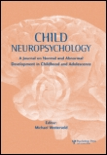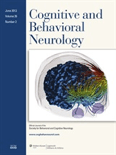
NEUROPSYCHOLOGY
Scope & Guideline
Unraveling the Complexities of Brain-Behavior Relationships
Introduction
Aims and Scopes
- Cognitive Assessment and Evaluation:
The journal publishes research on various neuropsychological assessments, including cognitive tests for different populations, exploring their reliability, validity, and cultural considerations. - Neurocognitive Disorders and Aging:
A significant focus is on neurocognitive disorders such as Alzheimer's disease, Mild Cognitive Impairment, and the effects of aging on cognitive functions, including studies on early detection, progression, and intervention strategies. - Impact of Sociodemographic Factors:
The journal addresses the influence of sociocultural and demographic factors on cognitive functioning and neuropsychological outcomes, emphasizing the importance of contextual factors in cognitive health. - Intervention Strategies:
Research on nonpharmacological and pharmacological interventions aimed at improving cognitive functioning across various disorders is a core area, including cognitive training and rehabilitation approaches. - Neuroscience and Cognition:
The integration of neuroscience with cognitive psychology is prevalent, with studies investigating brain-behavior relationships, neuroimaging findings, and neural correlates of cognitive processes.
Trending and Emerging
- Cultural Neuropsychology:
There is a rising focus on cultural and contextual influences on cognitive assessment and performance, emphasizing the need for culturally sensitive approaches to neuropsychological practices. - Neuropsychological Impacts of COVID-19:
Research examining the cognitive and psychological effects of the COVID-19 pandemic on various populations is becoming increasingly prominent, highlighting the importance of understanding environmental impacts on cognitive health. - Technological Integration in Assessment:
The use of digital tools and technology in neuropsychological assessments, including telehealth and online cognitive tests, is gaining traction, reflecting a shift towards more accessible and adaptable assessment methodologies. - Longitudinal and Developmental Studies:
Emerging themes include longitudinal studies tracking cognitive changes over time and developmental perspectives that examine cognitive growth and decline across the lifespan. - Interdisciplinary Approaches:
An increasing number of studies are integrating findings from neuroscience, psychology, and social sciences to provide a more comprehensive understanding of cognitive functioning and its underlying mechanisms.
Declining or Waning
- Traditional Neuropsychological Assessment Methods:
There appears to be a reduced emphasis on classic neuropsychological assessments in favor of more innovative, technology-driven approaches, such as computerized testing and real-world assessment strategies. - General Population Studies:
Research focusing on neuropsychological assessments in general populations is becoming less frequent, with a growing interest in specific clinical populations or culturally diverse groups instead. - Single-Domain Cognitive Studies:
There is a noticeable decline in studies examining single cognitive domains in isolation, as researchers increasingly adopt a more holistic approach to understanding the interactions between multiple cognitive functions.
Similar Journals

NEUROPSYCHOLOGY REVIEW
Pioneering Research at the Forefront of Cognitive ScienceNEUROPSYCHOLOGY REVIEW is a prestigious journal published by Springer, dedicated to the exploration of cognitive processes and behavior through neurological and psychological perspectives. With its ISSN 1040-7308 and E-ISSN 1573-6660, this journal holds a distinguished position in Q1 of the Neuropsychology and Physiological Psychology category, ranking at #3 out of 76 with an impressive 96th percentile in Scopus. Since its inception in 1990, it has provided a critical platform for researchers, professionals, and students to disseminate and engage with comprehensive reviews and empirical research, promoting a deeper understanding of the interplay between neural mechanisms and psychological phenomena. Aimed at fostering interdisciplinary collaboration and advancement in the field, NEUROPSYCHOLOGY REVIEW invites contributions that push the boundaries of knowledge and stimulate ongoing debates in neuropsychology, making it an invaluable resource for anyone interested in the latest scientific advancements within this dynamic area.

ARCHIVES OF CLINICAL NEUROPSYCHOLOGY
Illuminating the Mind: Where Psychology Meets NeurologyARCHIVES OF CLINICAL NEUROPSYCHOLOGY is a premier academic journal dedicated to the vital intersections of clinical psychology, neuropsychology, and psychiatry, offering researchers and clinicians a platform to publish cutting-edge findings and comprehensive reviews. Published by Oxford University Press, the journal aims to advance the understanding of the cognitive and psychological aspects of neurological conditions through rigorous empirical research and innovative methodologies. With an impressive range of quartile rankings, including Q2 in Clinical Psychology and Neuropsychology, the journal stands out for its commitment to enhancing clinical practices and improving patient outcomes. Although it does not offer open access, its reputation is underscored by a competitive impact factor, making it a critical resource for professionals in the field looking to stay informed on the latest developments. The journal has been a respected outlet since 1986, and as it continues into 2024, it remains a beacon for scholarly discourse in neuropsychology and mental health.

BRAIN AND COGNITION
Unlocking the Mysteries of Brain and CognitionBRAIN AND COGNITION, published by Academic Press Inc Elsevier Science, stands as a vital resource for researchers and practitioners in the realms of cognitive neuroscience and psychology. Established in 1982, the journal has continuously evolved, showcasing cutting-edge research that bridges the understanding of brain functions and cognitive processes up to 2024. With an impressive impact factor reflecting its commitment to high-quality scholarship, the journal currently holds a prestigious Q1 ranking in Arts and Humanities (miscellaneous) and notable Q2 rankings in various psychology fields, including Cognitive Neuroscience, Developmental and Educational Psychology, Experimental and Cognitive Psychology, and Neuropsychology. This multidisciplinary journal cultivates a rich academic dialogue, offering valuable insights to professionals, researchers, and students alike. Although it does not offer open access, its robust indexing in Scopus and consistent contribution to important discussions in cognitive research define its critical role in advancing knowledge and innovation in the cognitive sciences.

AGING NEUROPSYCHOLOGY AND COGNITION
Illuminating the path to cognitive health in later life.AGING NEUROPSYCHOLOGY AND COGNITION, published by ROUTLEDGE JOURNALS, TAYLOR & FRANCIS LTD, is a leading scholarly journal that spans the interdisciplinary fields of psychology, neuropsychology, and gerontology. With a strong focus on understanding aging processes and cognitive function, this journal serves as a critical platform for researchers, clinicians, and students dedicated to advancing knowledge in the realm of cognitive aging. The journal, established in 1994, presents high-quality research articles, comprehensive reviews, and innovative studies that contribute to the discourse surrounding mental health and aging. Notably, it has been recognized with a 2023 Q2 ranking in Experimental and Cognitive Psychology and Neuropsychology categories, reflecting its significant impact within these domains. The journal includes open access options, making it widely accessible to a global audience. Researchers interested in the latest findings and theoretical developments in aging neuropsychology will find this journal an invaluable resource, further enhanced by its robust Scopus rankings and commitment to academic excellence through 2024 and beyond.

Frontiers in Human Neuroscience
Exploring the Complexities of the Human BrainFrontiers in Human Neuroscience is a premier open access journal published by FRONTIERS MEDIA SA, dedicated to advancing the understanding of the complexities of human neuroscience. With an ISSN of 1662-5161, the journal has established its prominence in various fields, achieving a Q2 ranking in categories such as Behavioral Neuroscience, Neuropsychology and Physiological Psychology, and Psychiatry and Mental Health as of 2023. Since its inception in 2008, Frontiers in Human Neuroscience has consistently contributed to the scholarly dialogue by offering a platform for innovative research that bridges the gap between neuroscience and behavioral science. The journal's rigorous peer-review process and commitment to open access ensures that findings are readily available, promoting collaboration and progress within the academic community. With an impact on neuroscience disciplines, it stands at the forefront of the field, inviting researchers, professionals, and students alike to engage with cutting-edge studies and developments. The journal's address is located in Lausanne, Switzerland, where it continues to flourish as a hub for neurobiological exploration.

Journal of Pediatric Neuropsychology
Innovating practices for neuropsychological health in youth.Journal of Pediatric Neuropsychology is a pioneering academic journal dedicated to advancing the field of pediatric neuropsychology. Published by SpringerNature, this journal serves as a vital platform for researchers, clinicians, and students aiming to explore the complexities of neuropsychological development in children. With ISSN 2199-2681 and E-ISSN 2199-2673, the journal focuses on a broad spectrum of topics including cognitive processes, neurological disorders, and the impact of neuropsychology on educational and therapeutic practices. Though currently not listed as an Open Access journal, it aims to disseminate knowledge that influences clinical practices and supports interdisciplinary collaboration. The Journal of Pediatric Neuropsychology stands out for its commitment to enhancing understanding within this specialized field, making it an essential resource for professionals and researchers dedicated to improving outcomes for children with neuropsychological challenges.

CHILD NEUROPSYCHOLOGY
Advancing the Science of Child DevelopmentCHILD NEUROPSYCHOLOGY, an esteemed journal published by Routledge Journals, Taylor & Francis Ltd, focuses on the intricate interplay between neurological and psychological development in children. With an ISSN of 0929-7049 and an E-ISSN of 1744-4136, this journal has been a pivotal resource in the field since 1995, catering to researchers, clinicians, and educators alike. The journal holds a prestigious position in the Q2 quartile across key categories such as Developmental and Educational Psychology, Neuropsychology and Physiological Psychology, and Pediatrics, Perinatology, and Child Health as of 2023. Ranking in the 74th percentile for Pediatrics and reflecting its significant contributions, CHILD NEUROPSYCHOLOGY aims to publish groundbreaking studies that expand understanding of neurodevelopmental disorders and inform clinical practices. While not open access, the journal ensures high-quality, peer-reviewed articles that are vital for advancing knowledge and improving outcomes in child health and education. As it continues to bridge the gap between research and practice, CHILD NEUROPSYCHOLOGY remains an essential resource for those dedicated to advancing the science of child cognitive and emotional development.

Cuadernos de Neuropsicologia-Panamerican Journal of Neuropsychology
Unveiling the complexities of cognitive disorders.Cuadernos de Neuropsicologia-Panamerican Journal of Neuropsychology is a premier open access journal dedicated to advancing the field of neuropsychology through the dissemination of high-quality research. Published by NEUROPSICOLOGIA CL in Chile, this journal has been a vital resource for the academic community since its inception in 2007. With a focus on various aspects of neuropsychological theory and practice, the journal aims to bridge the gap between research and application, addressing key issues in diagnosis, treatment, and rehabilitation of cognitive disorders. By providing a platform for innovative studies, systematic reviews, and compelling case reports, Cuadernos de Neuropsicologia plays an instrumental role in shaping the future of neuropsychology in the Pan-American region and beyond. Researchers, clinicians, and students alike will find this journal invaluable for staying informed on the latest trends and findings in their field.

MEMORY & COGNITION
Unlocking the Secrets of Memory and MindMEMORY & COGNITION is a premier journal published by SPRINGER, dedicated to advancing the understanding of cognitive processes related to memory. Established in 1973, this esteemed journal covers a wide range of topics within the fields of experimental and cognitive psychology, neuropsychology, and physiological psychology, cementing its status as a leading voice in the arts and humanities. With an impressive impact factor and a consistent Q1 ranking across multiple categories, MEMORY & COGNITION attracts high-quality research that elucidates the intricacies of memory function and cognition. The journal is nestled within the competitive landscape of academic publishing in the United States and maintains robust accessibility options, inviting both quantitative and qualitative analyses from researchers, professionals, and students alike. By fostering interdisciplinary dialogue and collaboration, this journal plays a pivotal role in shaping the future of cognitive research, making it an invaluable resource for its readership.

Cognitive and Behavioral Neurology
Transforming Understanding in Cognitive NeuroscienceCognitive and Behavioral Neurology is a prominent peer-reviewed journal dedicated to advancing the understanding of cognitive and behavioral aspects of neurological disorders. Published by Lippincott Williams & Wilkins, this journal has established itself as a vital resource for researchers, clinicians, and students in the fields of cognitive neuroscience, neuropsychology, and psychiatry. With an ISSN of 1543-3633 and an E-ISSN of 1543-3641, it offers a robust platform for the dissemination of high-quality research, as evidenced by its positioning in the Q3 quartiles across various categories, including Cognitive Neuroscience and Psychiatry. The journal, which has been actively publishing since 2003, encourages innovative studies that explore the intersection of cognition and behavior in neurological contexts. As a vital contributor to the academic dialogue on these topics, it provides an essential archive of findings and discussions that inform clinical practice and educational approaches, reflecting its commitment to improving patient outcomes and enhancing neurological science.